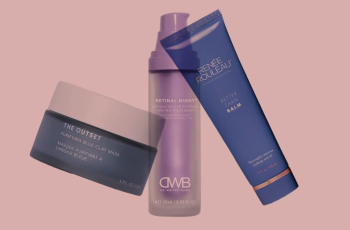
Bisabolol in Skin Care Products: The Gentle Soothing Ingredient Your Skin Needs
When it comes to calming and soothing sensitive skin, bisabolol stands out as a powerhouse ingredient.
Found naturally in plants like chamomile, cannabis, and the candeia tree, bisabolol is prized for its anti-inflammatory and skin-loving properties.
In this article, we’ll explore what bisabolol is, how it benefits your skin, which products feature it, and important safety considerations.
What Is Bisabolol?
Bisabolol, also called α-bisabolol or levomenol, is a terpene alcohol extracted from certain plants. The most well-known source is chamomile, a plant famous for its calming effects on the skin and mind.
But bisabolol is also found in cannabis and the candeia tree. This natural ingredient is recognized for its soothing and anti-inflammatory powers.
Beyond soothing, bisabolol also helps improve the absorption of other skincare ingredients.
This penetration enhancer quality means it allows your products to work better when layered together, boosting their effectiveness.
The Science-Backed Benefits of Bisabolol for Skin
Bisabolol offers multiple benefits that make it a favorite in skincare formulations, especially for those with sensitive or irritated skin.
Anti-inflammatory: Bisabolol helps reduce inflammation and redness, making it ideal for calming irritated skin.
Antimicrobial: It has natural antimicrobial properties that can help keep acne-causing bacteria at bay.
Moisturizing & Humectant: Bisabolol attracts moisture to the skin and helps keep it hydrated.
Penetration Enhancer: It improves the skin’s ability to absorb other ingredients, maximizing their benefits.
These benefits make bisabolol a common ingredient in skincare designed for sensitive skin types and conditions like rosacea.
Who Should Use Bisabolol?
If your skin is prone to redness, irritation, or inflammation, bisabolol can be a game-changer.
It’s commonly used in products for sensitive skin and is especially effective for reducing redness caused by rosacea.
People with acne will also find bisabolol helpful. It soothes the redness and swelling from pimples and speeds up healing of acne marks.
Bisabolol is also included in treatments for eczema, psoriasis, and other inflammatory skin conditions, where calming and soothing effects are needed.
Best Skin Care Products with Bisabolol
If you’re interested in trying bisabolol, here are five standout products rich in this ingredient:
Essopi Triple Antioxidant Serum – Combines antioxidants with bisabolol to calm and protect the skin.
Essopi Triple Antioxidant Cream – A moisturizing cream that soothes and nourishes sensitive skin.
Replenix Redness Reducing Triple AOX Serum – Designed specifically to reduce redness and calm inflammation.
Revision Skincare Firming Night Treatment – Combines anti-aging and soothing properties to support skin overnight.
SkinCeuticals Redness Neutralizer – Targets redness and irritation with bisabolol and other calming agents.
These products showcase how bisabolol can be incorporated into both everyday skincare and targeted treatments.
How Does Bisabolol Work on the Skin?
Bisabolol’s main role is to soothe inflammation. It calms irritated skin by reducing the production of inflammatory chemicals. This helps ease redness, swelling, and discomfort.
Its antimicrobial nature helps prevent bacterial infections that can worsen acne and other skin conditions.
Bisabolol’s moisturizing ability keeps skin hydrated and supports the skin barrier. A strong barrier is essential for healthy, resilient skin that can better defend against irritants.
Finally, bisabolol boosts the absorption of other ingredients, making your skincare routine more effective overall.
Bisabolol for Specific Skin Conditions
Acne: Bisabolol reduces the redness and swelling caused by pimples and acne lesions. It also speeds up healing, helping scars and red marks fade faster.
Sensitive Skin: It’s frequently added to products designed to calm and soothe sensitive or reactive skin, helping reduce irritation and discomfort.
Rosacea: One of the best ingredients for managing rosacea, bisabolol helps prevent and treat facial redness associated with this chronic condition.
Eczema: When used alongside barrier repair moisturizers, bisabolol helps soothe the itching and irritation common in eczema-prone skin.
Psoriasis: Its calming effects can reduce the itchiness and redness of psoriasis patches, improving comfort.
Does Bisabolol Help With Dark Spots and Hyperpigmentation?
Bisabolol has a mild skin-lightening effect due to its anti-inflammatory properties, which may help prevent inflammation-induced hyperpigmentation.
However, it’s not as potent as other skin brightening agents. For the best results in treating dark spots, combine bisabolol with ingredients like:
PAR-2 blockers
Tyrosinase inhibitors
Retinoids
Also, ensure your moisturizers contain unsaturated fatty acids to support skin repair.
Using bisabolol as part of a broader hyperpigmentation routine can help keep your skin calm and balanced while addressing discoloration.
Are There Any Side Effects of Bisabolol?
Generally, bisabolol is safe and well-tolerated. It is considered a clean ingredient and is rated 1-2 by the Environmental Working Group (EWG), meaning it poses low health risks.
However, some people with allergies to plants in the Asteraceae (Compositae) family might react to bisabolol. This plant family includes ragweed, chamomile, echinacea, chrysanthemums, marigolds, and others.
If you have a known allergy to these plants, you could experience skin irritation or a rash when using products with bisabolol.
When Should You Avoid Bisabolol?
If you’re allergic to ragweed or other Asteraceae family plants, it’s wise to avoid bisabolol. Cross-reactivity means your immune system may mistake bisabolol for the allergens you react to in plants like:
Ragweed, Chamomile, Echinacea, Chrysanthemums, Marigolds, Dandelions
Sunflowers (rarely, due to absence of proteins)
Tansy and wormwood
Also, some people react to pollen from these plants, so inhalation can trigger allergies too.
Is Bisabolol Toxic?
No, bisabolol is non-toxic. It’s considered safe for topical use in skincare and carries a low hazard rating. Its clean ingredient status makes it a favorite in natural and organic skincare lines.
How to Incorporate Bisabolol Into Your Routine
Look for serums, creams, and treatments labeled as calming, anti-redness, or suitable for sensitive skin. Bisabolol is often combined with other gentle ingredients like panthenol and antioxidants.
Patch test new products to check for any reactions, especially if you have plant allergies.
If you want to maximize bisabolol’s benefits, layer it with products that contain antioxidants and skin barrier-repairing ingredients.
Final Thoughts: Why Bisabolol Deserves a Spot in Your Skincare
Bisabolol is a versatile, gentle ingredient that helps soothe inflammation, reduce redness, and hydrate the skin. It supports healing in conditions like acne, rosacea, eczema, and psoriasis.
Its natural origins and low risk of irritation make it ideal for sensitive skin types. Whether you’re battling redness, irritation, or simply want a calming boost in your skincare, bisabolol is worth trying.
Always check ingredient lists, consider your allergies, and select products that combine bisabolol with complementary ingredients for best results.
If you want a personalized recommendation on bisabolol products tailored to your skin type, feel free to take our skin quiz! It’s a simple way to discover the best skincare for your unique needs.


